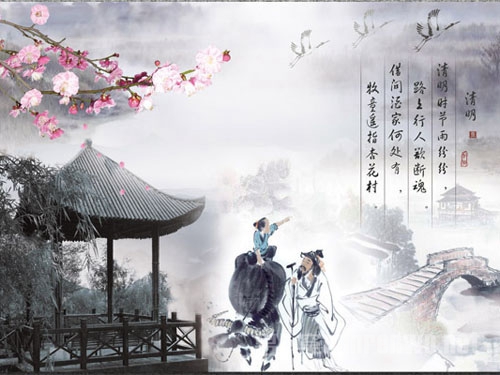China’s Tomb Sweeping Day
清明节
April the fourth or fifth of the solar year (according to the Gregorian calendar) is a traditional day for the Chinese people to show respect for their ancestors.
每年公历4月4日(或5日)的清明节,是中国人传统的扫墓祭祖、哀悼先人的纪念日。
On this day, people sweep their ancestors’ tombs and burn paper money to wish their ancestors good luck.
每到了这一天,人们纷纷来到祖先的墓地,焚化纸钱,拜祭先人。
There is a legend related to this tradition.
清明节这一习俗源于晋文公重耳悼念介之推的。

According to the legend, during the Spring and Autumn Period, a person named Jie Zhitui followed his master Chong’er, the prince of Jin, and stayed with him during all the 19 years when the prince was in exile.
传说:相传春秋时期,晋国的介之推跟随晋公子重耳逃亡国外19年,忠心耿耿。
Jie Zhitui was so loyal to his master that once when the prince was starved to death, Jie cut one piece of flesh from his leg to feed his master so as to save his life.
一次重耳在魏国被困,几天吃不上饭,介之推就偷偷割下自己腿上的肉来给他吃。
However, when the prince ascended the throne and became king of the Jin state, he forgot about Jie Zhitui completely. He awarded all his other followers except Jie.
后来,重耳回国登上王位,成了晋文公,对跟随他逃亡的大臣论功行赏,却偏偏忘了介之推。
Jie, on his part, left his master with his old mother without even one word of complaint.
介之推也没有争功,自己一个人背起老母悄然离去。
The local people were very indignant about this and they compiled a rhyme to satirize the king.
晋国的老百姓很替介之推鸣不平,就编了一首歌谣讽刺晋文公。
The king learned about this and in order not to ruin his reputation, he ordered his men to go to Jie’s home to bring him back,yet they failed to find Jie.
晋文公得知后,立即派人去介之推家里找他,却没找到。
The king then learned that Jie had hidden in the Mian Mountain, so he ordered his men to search the mountain,again, they failed to find Jie.
后来听说介之推去了绵山,又派人去找,也没找到。
The king knew that Jie was a filial son, so he thought if he set the mountain on fire, Jie,for his mother’s sake,would definately come out.
晋文公知道介之推很孝顺,就想在绵山上放一把火,逼迫介之推自己背着母亲跑出来。
The fire lasted three whole days and nights,
绵山一场大火烧了三天三夜。
In the end,Jie and his mother’s burned bodies were found beside a tree.
当晋文公派人去看时,介之推母子已抱着一棵枯柳被烧死了。
That was the 103rd day after the Winter Solstice.
这一天正好是冬至后的103天。
The local people admired Jie Zhitui for his moral integrity.
老百姓很敬佩介之推的骨气,
To commemorate him, they ate cold food and restrained from making fire on that day and the following two days.
后来每到了这一天,人们就不忍心生火做饭,连续3天只吃冷食,以纪念介之推。
Due to the fact that Cold Food Day and Pure Brightness often fall on the same day, the two are combined to form a comprehensive folk festival, during which time people go for outings, play kites, and sweep their ancestors’tombs.
因为寒食节和清明节在日期上经常是在同一天,久而久之,人们 便将寒食与清明融合在一起,逐渐形成了祭祖、扫墓、踏青、放风筝等习俗,从而使 清明、寒食融为一体,成为一个综合性的民俗节日。
注:寒食节是每年冬至后的103天,也就是次年的4月4日(如果2 月是29天,则为4月3日),而清明一般是每年的4月4日或5日,所以经常是在同一天的。












